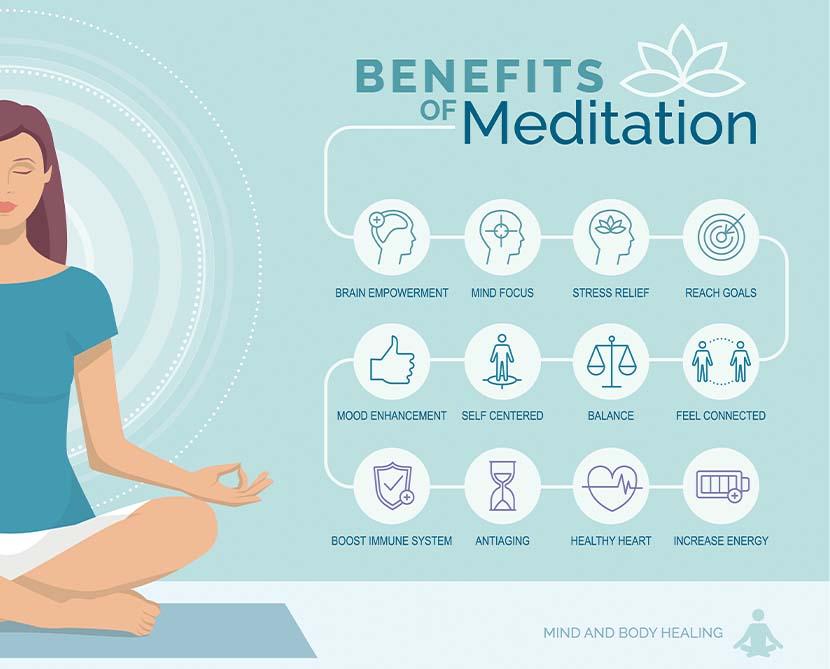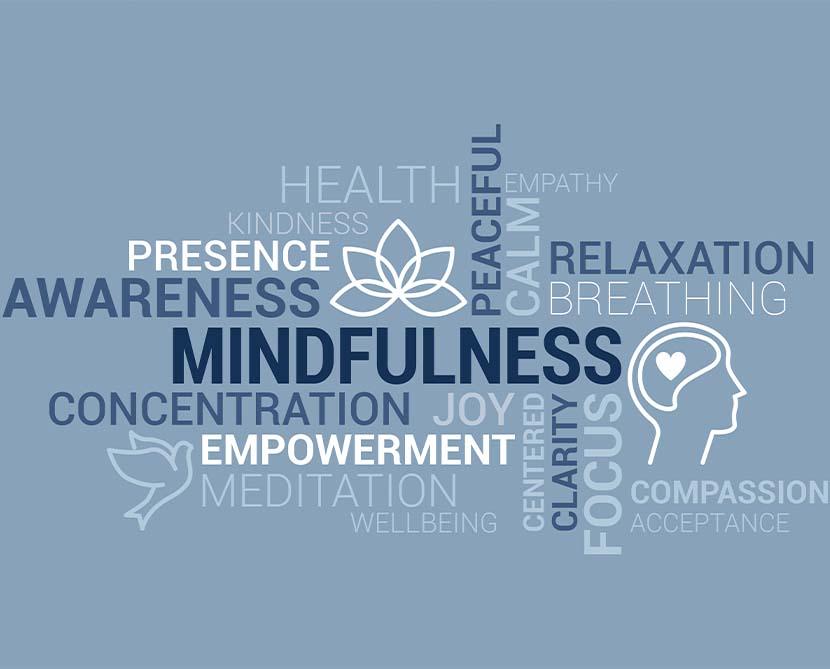Can Meditation Help with Anxiety and Stress levels? The answer is Yes. Meditation as a practice has been used for centuries in many cultures to promote peace and well-being within their communities.
Although it was not popular in the Western Side of the world until recently, it has quickly been recognized as a fantastic way to slow down life and develop a calmness where there may have been previously chaos.
What is Meditation, and How Can I Adapt it to Fit My Lifestyle?
So the vision of meditation for many that have never tried it before may be a dark room full of cross-legged people humming or chanting.
For many western beginners, the thought of joining in can be daunting. However, the truth is that meditation is more about the focus, awareness, and calming of the mind than the actions taken when achieving this.
A basic explanation of meditation is that it is a mental exercise that is used to:
- Bring calmness to the mind.
- Bring the thoughts to the moment only, and ignore distractions and worry from the past and future.
- Train awareness and pay attention second by second in that time-space, letting all concerns for other moments pass.
- Train the mind to focus on only one or two things happening at that moment and not wander and chatter during this training.
- Bring the body and mind together for the wellness of the physical body, mental thought, and overall wellness of the practitioner.
- Lastly, to learn to bring the body from a state of hypervigilance and stress to a state of calm with a focus on the mind and body.


Meditation can look like many things to different people. Meditation generally focuses on a sensation or object, so meditation can translate into many actions.
Meditation can be a specific form of Yoga, as the mind concentrates on the body’s movement and breathing practices.
It can also be in a sitting position (like the lotus position) or an easy pose listening to music or concentrating on breathing.
Yoga also incorporated a method of Meditation at the end of a class with savasana (corpse Pose) and led by a teacher through a guided meditation.
Listening to specific sounds such as sound bowls, relaxing music, or white noise such as rain, beach, wind, or animal noises. Specific frequencies during meditation can lead to the healing of specific mental and physical conditions.
What are Stress and Anxiety?
Stress is a commonly occurring part of everyday life. Timelines, deadlines, adverse events, and incidents can cause stress.
There is also chronic stress which is caused by a series of events that compound and cause you to be continuously more and more stressed without relief.
One severe or traumatic event can also cause you to be stuck in a state of stress where an inconvenient event turns into a stressful event due to your already heightened senses.
Stress in any form can be detrimental to your health. However, ongoing or acute stress can lead to severe health conditions such as heart disease, hair loss, weight gain, and mood disorders such as depression and anxiety.
Anxiety in small amounts is normal. For example, feeling nervous before a significant or stressful event is expected.
However, when the feeling of impending doom, fear, dread, or fear starts happening in everyday events or continuously, this can lead to depression and stress.
Mild and severe anxious conditions can be life-changing and debilitating and inhibit the enjoyment of life.
More seriously, it can lead to physical conditions such as panicking conditions with panic attacks, incorporating heart palpitations, panting weight loss, and loss of appetite.
How Can Meditation Assist if I have Anxiety Or Stress In My Life?
Anxiety is a condition where the mind creates fear for a future event, which can be an actual event or an imagined event.


For example, for some with anxiety, simply leaving the house can cause anxiety, leading to stress. For others, life has been unkind, and a single or series of events has caused them to have anxiety without pinpointing the exact reason that day.
The point is that the mind lives in the future or the past and brings fear from past or imagined events into the mind, affecting the body.
Stress is a physical reaction to being unable to relax and calm down. This can also affect the body.
Meditation is shown to bring significant improvements to the symptoms of stress and anxiety. But how does this work? What are the immediate benefits, and what are the long-term benefits?
The Short-Term And Long-Term Benefits of Meditation For Stress and Anxiety
There are short-term and long-term benefits to starting and maintaining a meditation practice if you suffer from stress and anxiety.
When walking into a meditation class for the first time, it will be normal to feel some anxiety regardless if you are there to get assistance with stress or anxiety symptoms.
However, if you allow yourself to be led by your meditation guide, you may find peace while learning to meditate.
Remember that everyone in that class is there for the same thing and that there is no judgment – in meditation classes, there is only support.
Short-Term Benefits of Meditation
Meditation will assist you in bringing your mind to the present moment.
Clearing the clutter, the chattery, and worrying thoughts that you may have become so used to that you don’t even hear them anymore.
Meditation brings your attention to your thoughts, lets you listen to them, and then releases them. So instead of them rattling around continuously in your mind, they are heard, acknowledged, and released.
During a class, your mind will be told to focus on a sound, your breathing, or the voice of your guide.
You will be regularly and gently reminded to clear your mind and instructed on how to do this.
Over time, your breathing will slow, your heart rate will regulate, and you may find a level of calmness and mindfulness that you have been unable to achieve for a long time.
This will release dopamine, serotonin, and oxytocin hormones, giving you a warm, happy, relaxed feeling. You may even fall asleep.
When the class is over, you may feel relief, calmness, and a sense of control that will leave the class with you and influence you for a time after class.
How long you maintain this feeling and calm afterward will increase with your experience and each class or personal practice.


Long-Term Benefits Of Meditation
The long-term benefits of Meditation for Stress and Anxiety are plenty and generous. They snowball into each other and, over time, will improve your overall wellness and health.
The physical and mental benefits long term of using Meditation to assist with reducing the acute symptoms of stress and anxiety are:
• Improved Sleep – Improving your sleep will help you feel more relaxed and refreshed daily. Feeling better during the day will help you make better decisions and feel better within yourself daily.
• Improved cognitive function – Memory and concentration improvement will help you remember tasks and instructions better. Being able to concentrate will assist you in performing better at home and work. Your confidence will improve, and you will improve your self-esteem.
• Reduced Negative Thoughts – Meditation teaches you to hear and release negative or distracting thoughts. You will learn to release negative thoughts that previously would repeat and roll over in your mind and move on with your day.
• Improved Immune system – Less stress and better sleep will improve your immune system by reducing inflammation in your body. Reducing inflammation means that your immune system is not exhausted but can rebuild, improving your health.
• Ability to concentrate and improve relationships – Stress, and anxiety in long-term conditions can impede your ability to focus and achieve goals. You can generally think much better when you sleep better, feel better, and control your negative thoughts. This improves your ability to problem solve and make decisions with confidence. It will also help in improving your personal and professional relationships.
Meditation Can Improve Your Quality of Life by Improving Your Mind, Which Will Benefit Your Body.
While there is quite a lot of research to be done, the research that has already been completed shows that meditation can have benefits and relieve stress and anxiety.
In layman’s terms, it creates a circuit breaker, snapping the cycle and giving you moments of peace that previously may have felt impossible. Like any tool or skill, it can take time to learn, and with time brings further improvements.
If you suffer from stress and anxiety symptoms, you have nothing to lose and perhaps a lot to gain by trying meditation.
For the best in high-quality meditation accessories, check out our recommendations to take your meditation to the next level.










